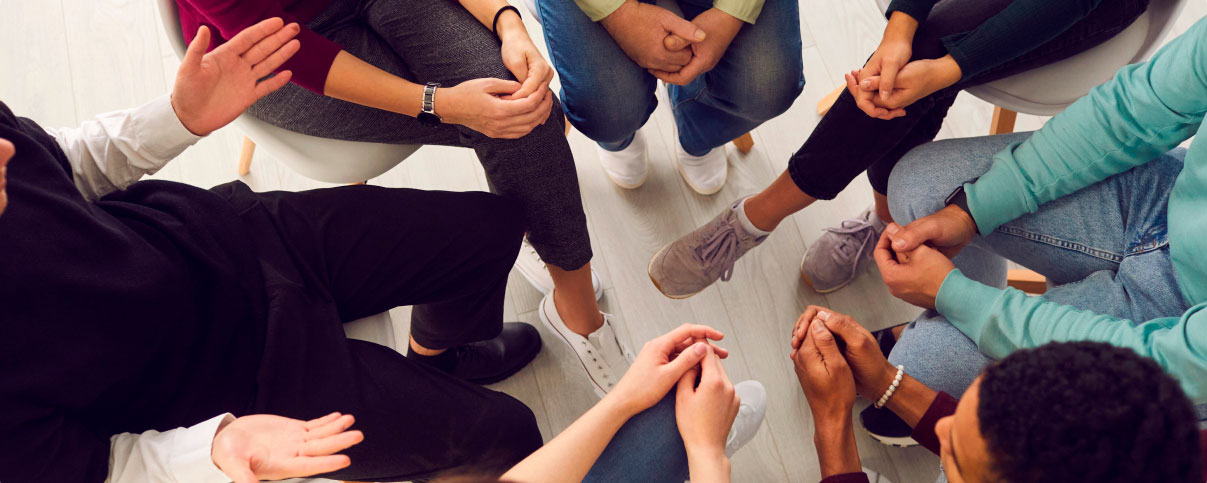Dr. Shafer provides psychotherapy groups for women, men, and persons in recovery from addiction. The Psychotherapy Groups provide insight and support outside of/or in addition or instead of family and friends.

Each group provides a private, supportive, and comforting community to address and disclose personal issues they feel they may not or cannot discuss elsewhere. Members can share without concern about being judged, talked about, or competing with one another.
In all the groups, members meet to address issues about trauma, domestic violence, work, mood imbalance, aging, parenting, betrayals, legal problems, relationships, abuse, being alone, and just being stressed out.

Holding the confidential space for men and women to share their diverse perspectives on living sober, the group provides the opportunity to share, get support, and obtain feedback.
As in all forms of psychotherapy, what is said here stays here. This sacred sharing among the participants in the circle led by Dr. Kathy, a certified addiction professional, offers support to remain on the recovery journey.
All members must maintain sobriety, and if you have relapsed please let Dr. Shafer know.
All members are actively working their own program of recovery (this may include attending 12-step meetings or not).
Learning new information and habits requires reflection, practice, and repetition. Research on the effectiveness of group therapy recommends monthly attendance for a year.

The women’s groups provides the opportunity for women to share about their life in a confidential, calm, secure space that encourages respectful and diverse perspectives.
There is no judgement here. No criticism. No gossip outside of the circle. What is said here stays here.
During this sacred sharing among women, led by a licensed psychotherapist, we discuss trauma, relationships, raising children, aging, legal issues, and betrayals.
Members of this group mindfully learn ways to be more confident about sharing with others, how to talk to each other with kindness, curiosity, and compassion (even if you disagree or have a different point of view).
Research on the effectiveness of change while in group therapy recommends monthly attendance for a year.
Group psychotherapy is the process of self-inquiry, and letting go.

Joining a men’s group is a POWERFUL opportunity to share about what’s happening in your life while being there for others. Sitting in a circle with other men provides the opportunity for community (having a tribe), connection, and can go a long way toward lowering stress levels and feelings of being alone.
In person, face-to-face contact is more important now than ever before. Connect with other men at Dr. Kathy’s confidential office to share your personal struggles and triumphs. The mens’ group offers opportunities for support, feedback, suggestions, and growth addressing a variety of issues, including:
The mens’ group helps participants to understand how the past may be impacting the present. Along with the input and support of fellow group members, and Dr. Kathy’s decades of experience and empathic presence, men can begin to understand the origins of their challenges and start to take charge of their healing and growth.
Simply put, joining together with other men can challenge you to be the most vital, expressive, powerful, and limitless version of you!
The wisdom gained in professionally led psychotherapy groups is to learn to show up, be responsible, develop ways to socialize with others, and how to receive and accept constructive feedback from the other group members.
By considering the different shared observations from others, clients experiment and practice the new communication skills they are learning. Furthermore, in the group meeting without fear of being judged, compared to, or competing with, group members learn what to say and when, diverse perspectives on how to say it, setting boundaries, and learning what not to say.
Group therapy assures members they are not alone. Sharing experiences provides the opportunity to receive support and give support to others. The bonding that occurs among group members from hearing different points of view on their situation, is prevalent in the sensing and knowing that others “have got their back.”
Additionally, group members can copy and try the successful behaviors of others who have been through similar circumstances, learning new ways to respond instead of reacting.